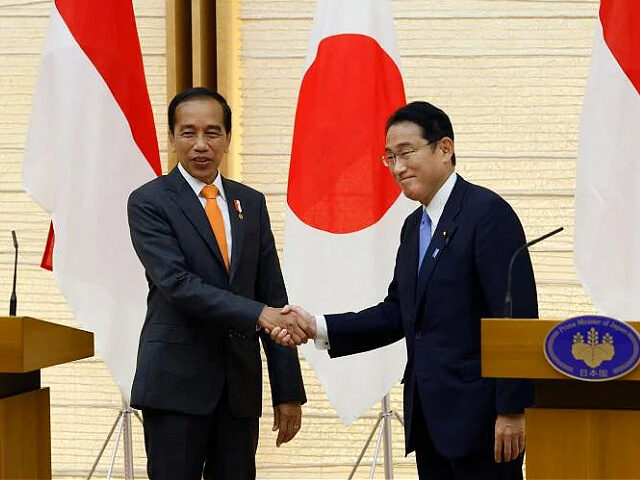The governments of Japan and Indonesia agreed on Wednesday to ramp up coordination across the defense sector in the coming months in an effort to counter Chinese aggression in the Indo-Pacific region, Kyodo News reported.
Japanese Prime Minister Fumio Kishida and Indonesian President Joko Widodo met in Tokyo on July 27 for bilateral talks, a day after Widodo met with dictator Xi Jinping in China.
Detailing the meeting’s highlights, Kyodo News relayed:
The two leaders affirmed bilateral defense cooperation, with the Japan Ground Self-Defense Force slated to join a multinational joint exercise in Indonesia in August for the first time, Kishida said in a post-meeting joint news conference with Widodo.
They pledged to step up coordination in realizing a free and open Indo-Pacific, with Japan vowing to strengthen maritime security in the region in response to China’s assertive posture and military buildup.
The agreement with Japan will likely strain relations with China, given that cooperation with Japan by a South China Sea country will likely be seen as a sign of concern regarding the Chinese Communist Party’s colonization of the region. Widodo nonetheless emphasized allegedly friendly relations with China during his meeting with Xi.
“China is Indonesia’s comprehensive strategic partner. We must fill this partnership with cooperation that is beneficial for our country, and at the same time for the region and the world,” Widodo told Xi during their bilateral talks, as quoted by Singapore’s Channel News Asia (CNA).
China’s state-run Global Times seemed to offer its own version of the same Widodo quote on July 27. The Chinese Communist Party-published newspaper wrote that Widodo told Xi, “Indonesia will work with China to keep deepening their comprehensive strategic partnership and make still greater contribution [sic] to regional peace and global development.”
China has ramped up its belligerent activity across the Indo-Pacific region in recent months. This activity includes Beijing’s regular deployment of naval, coast guard, and fishing vessels to Japanese territorial waters, as well as its near-daily penetration of Taiwan’s air defense identification zone (ADIZ) through aggressive air force detachments.
Indonesia has been forced to defend its territorial waters from Chinese vessels several times in recent years. Widodo in January 2020 broke his usual stance of attempting to appease China when he led an unofficial naval “stand-off” against Beijing in the waters of Indonesia’s northern Natuna islands. The dispute emerged after a Chinese coastguard vessel accompanied by a fleet of illegal Chinese fishing boats refused to leave the territory.
“In an unusually strong statement, President Joko Widodo told reporters: ‘There is no negotiation when it comes to our sovereignty,'” Reuters noted at the time.
Indonesia maintains economic and political ties with China through Beijing’s Belt and Road Initiative (BRI). The Chinese government-funded program allows Beijing to fund infrastructure projects in developing or lower-income countries. Beijing bases its BRI projects on dubious loan structures that often pull already indebted nations further into debt to the Chinese Communist Party.

COMMENTS
Please let us know if you're having issues with commenting.